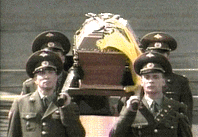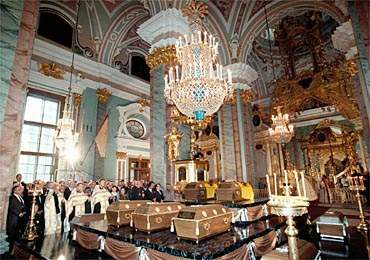BURIAL OF THE LAST IMPERIAL FAMILY
July 17, 1998 - The BBC -
![]()
 |
| The coffin of the last Tsar |
The last Tsar of Russia, Nicholas II, and his family have been buried in St Petersburg's St Peter and Paul Cathedral, exactly 80 years after their execution by Bolshevik revolutionaries. The nine coffins bearing the remains of Nicholas II, his wife, three of his children and four loyal staff were interred in the crypt of the cathedral's St Catherine Chapel, the resting place of Russian emperors since the reign of Peter the Great. Addressing the funeral ceremony, President Boris Yeltsin described the murder of the Russian royal family as one of the most shameful pages in Russian history, and urged Russians to close a "bloody century" with repentance. He said: "Today is a historic day for Russia. For many years, we kept quiet about this monstrous crime, but the truth has to be spoken." Mr Yeltsin said he had no choice but to attend this funeral in consideration of the fact that the funeral presented a historical chance for the Russian people to exculpate themselves from the sins of their fathers, and the sins of the murder of their Romanov family. On behalf of the Romanov family, Prince Nikolay Romanov, expressed delight at the Russian president's decision to attend the funeral. "We understand that he is a very busy person and has many other issues he has to deal with in the interests of and for the good of Russia but, even so, he has found the time to come," the prince told a Russian news agency. Dozens of the Tsar's relatives and diplomats from more than 50 countries watched the Tsar's coffin being laid to rest as cathedral bells tolled and soldiers gave a 19-gun salute. The burial was the final stage of a three-day ceremony which has run into deep controversy: the Orthodox Church have disputed the authenticity of the remains, while some Russians felt the proceedings were not grand enough. President Yeltsin initially refused to attend the burial ceremony out of respect to the Russian Orthodox Church but then announced he would be attending the burial after all. He said he had changed his mind so that the current generation of Russians could atone for the sins of their ancestors. The ceremony in Russia's old imperial capital, was intended to be a gesture of national reconciliation and atonement for the country's violent past. Instead, the event caused sharp divisions. Scientists say the bones are 97% likely to be those of Tsar Nicholas II and other members of the Romanov family shot by a Bolshevik firing squad. But the Patriarch of the Orthodox Church in Russia, Alexei II, has disputed the authenticity of the findings and refused to officiate at the burial. As a result, bishops were banned from taking part in the funeral ceremony and only junior clerics were allowed to participate. Patriarch Alexei conducted an alternative memorial service outside Moscow after a rival branch of the Romanov family complained that the official burial was not grand enough. There was also a dispute over which city should become their final resting place: Yekaterinburg where the remains were found seven years ago, Moscow, as the present Russian capital, or St Petersburg, the location of the burial grounds of the Tsars.

July 17, 1998 - The BBC -
The following is the translated speech given by Russian President Boris Yeltsin at the funeral service of the Russian Imperial Family:
"Esteemed fellow Russians! Today is an historic day for Russia. Eighty years have passed since the day of the murder of the last Russian emperor and members of his family. For many years we kept quiet about this monstrous crime, but the truth has to be spoken. The execution in Yekaterinburg became one of the most shameful pages in our history. By committing to the ground the remains of the innocent victims, we want to atone for the sins of our fathers. It is those who committed this evil and those who justified it for decades who are guilty. We are all guilty. We cannot lie to ourselves, explaining the senseless cruelty by political goals. The execution of the Romanov family is the result of an irreconcilable split in Russian society between ours and theirs. Its consequences are being felt even now. The funeral of the remains of the victims of the Yekaterinburg tragedy is first and foremost an act of human justice. It symbolizes the unity of the people and atonement for the common guilt. We all have an obligation before the historical memory of the people, and for that reason I couldn't fail to come here today. As a human being and as a president I have to be here. I bow to the victims of the merciless murder. While building a new Russia, we must look for support to its historical experience. Many glorious pages of the history of our country are linked with the Romanovs. But one of its most bitter lessons is linked to this name - any attempts to change life by means of violence are doomed. We are obliged to complete the century which for Russia became a century of blood and lawlessness, repentance and reconciliation, irrespective of political views, religion and nationality. This is our historic chance. On the threshold of the third millennium, we have to do this in the name of current and future generations. Let us remember those who became innocent victims of hatred and violence. May they rest in peace."
![]()